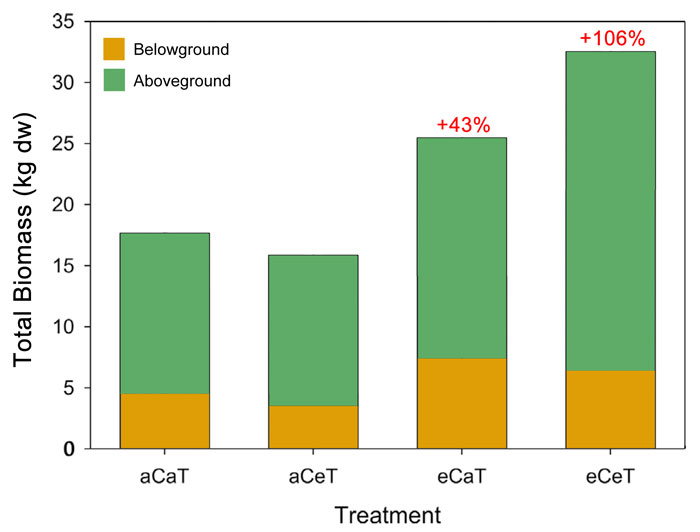Interactive Effects of CO2 and Temperature on Eucalyptus Tree Growth
Macdonald, C.A., Anderson, I.C., Khachane, A., Singh, B.P., Barton, C.V.M., Duursma, R.A., Ellsworth, D.S. and Singh, B.K. 2021. Plant productivity is a key driver of soil respiration response to climate change in a nutrient-limited soil. Basic and Applied Ecology 50: 155-168.
While the positive effects of rising atmospheric CO2 on plant growth are well-recognized, climate alarmists often claim such benefits will be reduced or turn negative when they occur in conjunction with model-projected future increases in air temperature. Thus experiments examining the interactive effects of CO2 and temperature are important for validating or invalidating such claims.
In providing some insight into this topic, Macdonald et al. (2021) grew Eucalyptus globulus trees from seedlings for 15 months in a nutrient-poor soil under ambient or elevated (+240 ppm) CO2 and ambient or elevated (+3°C) temperatures. The research was performed at the Hawkesbury Forest Experiment location at the University of Western Sydney, Richmond, NSW, Australia, where each tree was grown in pots in whole-tree environment-controlled chambers. At the end of the 15-month period the trees were harvested and their growth differences were analyzed.
According to the authors, plant height and total aboveground biomass increased significantly under elevated CO2 alone (P < 0.05), but were unaffected by elevated temperature alone. In particular, as shown in the figure below, elevated CO2 stimulated total above and below ground biomass by 43% compared to ambient CO2 and temperature conditions. Similarly, results indicated that “both fine root (< 5 mm) and recoverable total root biomass were significantly greater under elevated CO2 (P < 0.01) but unaffected by elevated temperature.”
Perhaps the big surprise, however, was the growth response observed in the combined elevated CO2 and elevated temperature treatment, which experienced the greatest increase in tree biomass among the four treatments. Compared to control conditions (ambient CO2 and ambient temperature) total tree biomass increased by a respectable 84%, whereas compared to the ambient CO2 and elevated temperature treatment it rose by a whopping 106%!
Consequently, for this eucalyptus tree species, its growth under elevated CO2 conditions through 15 months was not negatively impacted by a 3°C rise in temperature. If anything, the concomitant increase in air temperature further stimulated its total biomass.

Figure 1. Mean total biomass of Eucalpytus globulus after 15 months exposure to different CO2 and temperature treatments. Treatment legend: aCaT = ambient CO2 and no warming, aCeT = ambient CO2 plus 3°C warming, eCaT = elevated CO2 (+240 ppm) and no warming, eCeT = elevated CO2 (+240 ppm) plus 3°C warming. Green and orange shading represent the total aboveground and belowground biomass at a given treatment level. Red text indicates the percent increase in total biomass due to elevated CO2 at a given temperature treatment. Adapted from Macdonald et al. (2021).
This article appeared on the CO2 Science website at http://www.co2science.org/articles/V24/may/a2.php
]]>